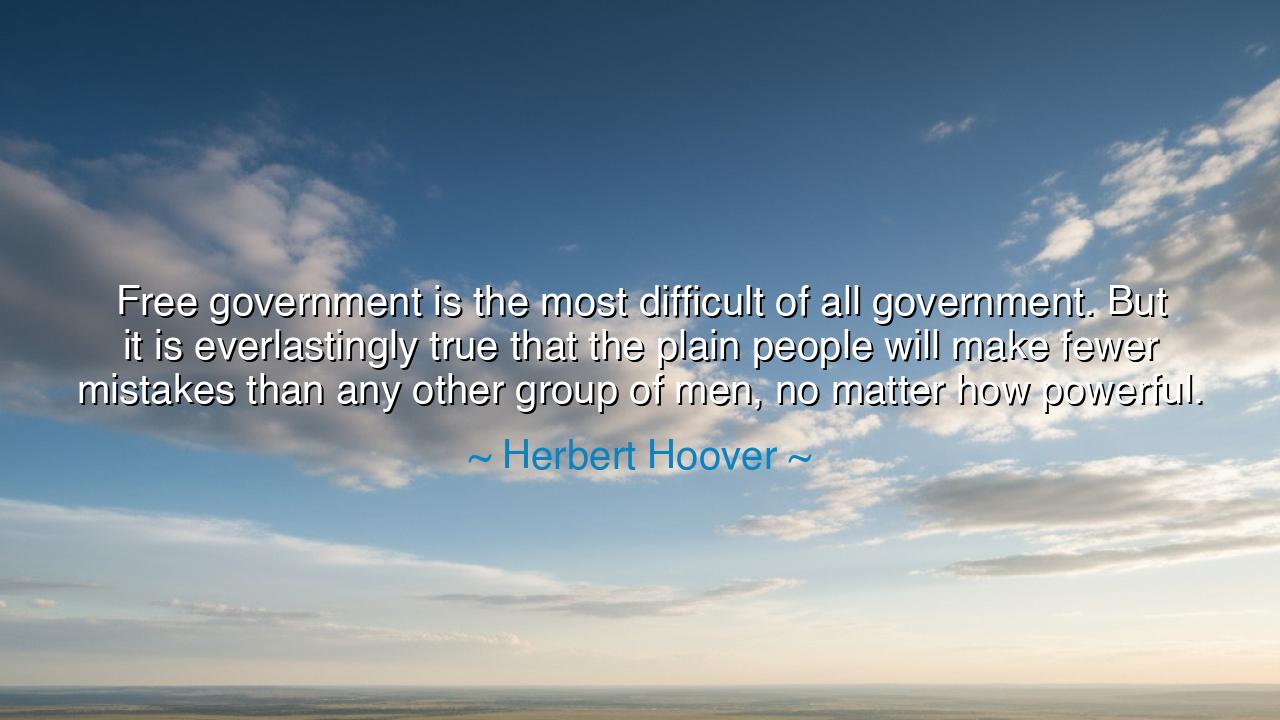
Free government is the most difficult of all government. But it
Free government is the most difficult of all government. But it is everlastingly true that the plain people will make fewer mistakes than any other group of men, no matter how powerful.






“Free government is the most difficult of all government. But it is everlastingly true that the plain people will make fewer mistakes than any other group of men, no matter how powerful.” Thus spoke Herbert Hoover, a man who had seen both the triumphs and trials of democracy in his lifetime. In these words, he captures one of the eternal paradoxes of human rule — that freedom, though fragile and complex, is more trustworthy in the hands of the ordinary citizen than in those of the mighty. His statement is not a naive faith in the crowd, but a profound trust in the conscience of the common man. For Hoover, the wisdom of the people, though imperfect, carries a moral clarity that the powerful, lost in ambition and pride, too often forget.
The origin of this quote lies in Hoover’s reflections on democracy after years of public service — as a humanitarian, a president, and a witness to both prosperity and crisis. Having led the United States during the dark years of the Great Depression, Hoover came to understand deeply the challenges of governing a free people. He did not speak from theory, but from the crucible of experience. “Free government is the most difficult of all government,” he declared, because liberty requires discipline, patience, and faith — qualities that are easily lost in times of fear or anger. To govern freely is to govern without tyranny, and this means accepting that the people themselves must bear both the burden of responsibility and the consequences of their choices.
Hoover’s words remind us that freedom is not ease. It is a discipline of the spirit. Monarchies and dictatorships may seem efficient, for they rest on the decisions of the few; but free government rests upon the will of millions — each flawed, each fallible, yet each capable of goodness. It is, by nature, messy, slow, and uncertain. Yet in that very uncertainty lies its genius. For when the “plain people” — the farmers, the laborers, the teachers, the small merchants — are given voice, the errors they make are human, not monstrous. Their mistakes can be corrected, for they spring from ignorance, not corruption; from passion, not cruelty. Power, when concentrated, leads to blindness and arrogance, but when shared among the people, it renews itself through honesty and correction.
History stands as Hoover’s witness. Consider the French Revolution, where the people rose to cast down kings, but in their fury turned to new despots who promised order. The lesson was harsh: freedom, if not guided by wisdom, may destroy itself. Yet even in that chaos, the idea of liberty endured, carried by the hearts of the common folk who still believed that no ruler, however gifted, had the right to own their destiny. So too in America’s own founding, the Founding Fathers built a republic not on the perfection of rulers, but on the consent of the governed — trusting that the “plain people,” through debate, dissent, and persistence, would steer the nation more rightly than any elite class of rulers. They believed, as Hoover later affirmed, that the people’s collective judgment, tempered by time, is wiser than the genius of a single man.
When Hoover says that “the plain people will make fewer mistakes than any other group of men, no matter how powerful,” he speaks not of intelligence, but of humility. The ordinary citizen, grounded in daily toil, feels the pulse of life as no distant ruler can. He understands fairness because he must live by it; he understands hardship because he endures it. The powerful, insulated by privilege, are too often tempted to believe they can shape destiny according to their own will. But the humble know that truth cannot be commanded; it must be discovered, together. The farmer, the worker, the mother — these are the quiet custodians of the republic, whose instinct for justice, though imperfect, is sincere. And it is sincerity, not brilliance, that sustains liberty.
Hoover’s warning is also a challenge to every generation. For free government demands participation, not passivity. It is not enough to love liberty; one must labor for it. The “plain people” must not only hold the right to vote, but the courage to think, to question, to act. When the people grow indifferent, freedom decays, and the powerful once more take the reins. Thus, the strength of democracy lies not in its leaders, but in the vigilance of its citizens. To remain free, a people must believe that their voice matters — and must use it.
Therefore, O listener, take this wisdom as a torch for your time. Cherish your freedom, but do not take it for granted. Remember that liberty is not maintained by the brilliance of rulers, but by the conscience of the governed. Be among the “plain people” who choose to engage, to learn, to question, to vote. Stand watch over those in power, for even the well-intentioned may forget their limits. And when you falter, remember Hoover’s faith — that though free government is difficult, it is still the noblest form of governance known to humankind, because it trusts in the better angels of the ordinary heart.
For in the end, it is not perfection that preserves a nation, but the people’s enduring belief in their own power to choose rightly. Free government may stumble, but it rises again, carried by the will of the many. And as long as the plain people remain awake and unafraid, liberty — though tested — shall never yield to tyranny.






AAdministratorAdministrator
Welcome, honored guests. Please leave a comment, we will respond soon